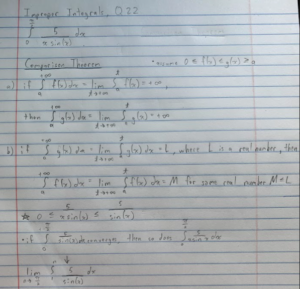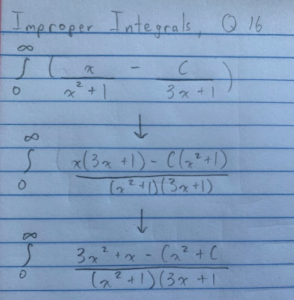
Improper Integrals question 22 involves using the Comparison Theorem to determine if this improper integral converges or diverges. The Comparison Theorem is defined in chapter 3.7. I’m not sure if what I did so far is correct since most examples and questions from the textbook use improper integrals that go to positive/negative infinity. Any help is appreciated
Author: Aaron (Page 1 of 2)

This is Question 16 from WebWork’s Improper Integrals: Solve for the constant C, then solve for the value of the convergent integral.
I understand that once C is found, it can be substituted in to solve for the convergent integral.
However, I don’t understand how to solve for the constant C. I looked up for help online and found this http://www.stumblingrobot.com/2016/03/31/find-constant-given-improper-integral-converges/
but I still don’t understand. The Improper Integral section of the textbook (chapter 3.7) doesn’t give examples or questions with constants. Any help is appreciated.
Group 2: Stewart B. , Alejandro D. , Aaron L. , Pablo.S , Jordan W.
Prof Poirer
MAT 1575- OL30
September 27, 2020
Secretary: Aaron Libato
Problem:
Work:
1) Starting from the indefinite integral of 1/((x^2) sqrt(36-x^2) dx, use integral substitution by having x = sqrt(36-x^2) then converting into x = (sqrt(36) / sqrt(x^2)) * sin(u) which then becomes x = 6sin(u) from which you can obtain dx = 6cos(u)
2) Substitute the x into the original problem to result in:
Indefinite integral of (1 / (6sin(u)^2)( sqrt(36 – 6sin(u))^2)) * 6 cos(u) du
3) Simplify in order to receive (6 cos(u) / ((6^3)sin^2(u))(sqrt(-sin^2(u)+1)) du
4) Cancel the 6 from the numerator and denominator as well as use the trig identity of
cos^2(x) + sin^2(x) = 1 in order to get (cos(u) / ((6^2)sin^2(u))(sqrt(cos^2(u)))) du
5) Further simplify using exponent and trig identity of cos(x)/sin(x) = cot(x) in order to get
cot(u) / ((36)sin(u)) (sqrt(cos^2(u)))) du
6) Use the trig identity of cos(x)sin(x) = sin2x/2 in order to simplify into
(cot(u) / (36sin(u)) (sin2(u)/2) du
7) Simplify into (cot(u) / 18 sin2u) du
8) Remove the constant to get (1/18) indefinite integral cot(u)/sin2(u) du
9) Use the trig identity sin2x = 2cos(x)sin(x) to get
(1/18) indefinite integral (cot(u) / 2cos(u)sin(u)) du
10) Remove the constant again to get
(1/18)(½) indefinite integral (cot(u) /cos(u)sin(u)) du
11) Multiply the constants and use the trig identities of cot(x) = cos(x)/sin(x) as well as 1/sin(x) = csc(x) in order to get
(1/36) indefinite integral csc^2(u) du
12) Solve indefinite integral to get (1/36) -cot(u) then sub u with arcsin(⅙)x which is obtained from x = 6sin(u):
(1/36) -cot(arcsin(⅙)x
13) Use trig identity of cot(arcsin(x)) = sqrt(1-x^2) / x in order to get
(1/36) – sqrt(1- (⅙) x^2) / (⅙)x
14) After multiplying and simplifying, the final answer is
Indefinite integral of (1/(x^2)(sqrt(36-x^2))) dx = (-sqrt(36-x^2) / 36x) + C




Recent Comments